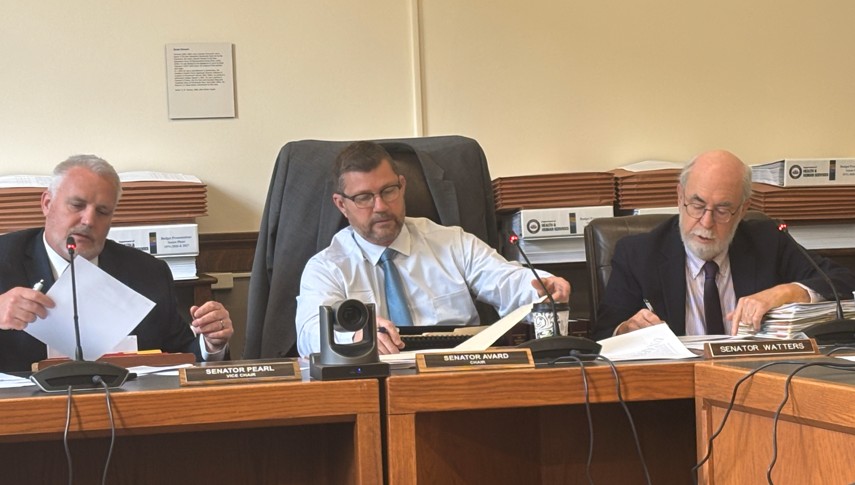By PAULA TRACY, InDepthNH.org
CONCORD – A bill that would have extended the state’s timber tax to properties enrolled in carbon sequestration programs has been changed by a Senate committee to a study committee and moratorium.
The amendment to House Bill 123 passed on a vote of 4-1 in the Senate Energy and Natural Resources Committee Tuesday.
In recent years, a new market has emerged for timberland property owners which has led to a reduction in local property tax revenue.
Rather than getting money from cutting trees, property owners can now enter their tracts into long-term and short-term agreements to sequester carbon or leave the trees standing so that corporations that are interested in achieving goals of carbon reduction, either voluntarily or through the California carbon registry.
This has had a growing impact on communities in the state that usually get local tax money from timber taxes, particularly in the North Country.
The original bill would have extended the current yield tax to assess and tax the value of the standing and growing timber with the annual growth taxed.
Opponents said it was a new tax while supporters said it simply closes a loophole to keep equity with other taxpayers.
The new study bill is likely to pass the full Senate and will then return to the House for consideration. If they concur, the bill will then go to Gov. Kelly Ayotte who is likely to sign.
The New Hampshire Timberland Owners Association, which represents almost 1,000 in the forest products industry, including property owners, opposed the moratorium portion of the amendment but supports the study committee, which could be as long as two years.
Jasen Stock, executive director of the NHTOA, said there is a lot of learning that needs to be done before the state passes any legislation and New Hampshire would be the first to do that.
The core issue for the study committee will be an issue of fairness and also a method for collection of such a tax, which the state Department of Revenue Administration said was unworkable in the bill.
“Whether the state’s current system of taxation fairly and properly taxes the transactions by which New Hampshire forest tracts are committed to carbon sequestration and the fair market value of those tracts,” will be the focus of the committee’s study, the bill now reads.
Members of this body, if passed will include one Coos County commissioner, one municipal official with experience in administration of the 10 percent timber yield tax who is appointed by the NH Municipal Association, one public member designated by the NHTOA and one public member designated by the current fee owner of the 146,000 Connecticut Lakes Headwaters forest in Pittsburg, Stewartstown and Clarksville, Aurora Sustainable Lands which has enrolled in carbon offset since 2013.
Also, if enacted, the committee will have a member of the NH Retail Lumber Association, the NH Home Builders Association, a state forester appointed by the president of the Senate and two members of the House, one member of the Senate. Also, the commissioner or designee from both the departments of Natural and Cultural Resources and the Department of Revenue Administration will be represented.
The bill also places a moratorium and reads that between July 1, 2025 and the date upon which the carbon sequestration programs study commission submits its report, no owner of standing timber in the state on a parcel of more than 500 acres “shall enter into or exercise any unexercised right pursuant to, any agreement or other arrangement to commit any part of such timber or its annual growth to the sequestration of carbon emission through enrollment or registration with a carbon offset program or otherwise,” according to the amended bill.





